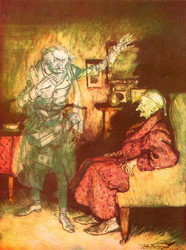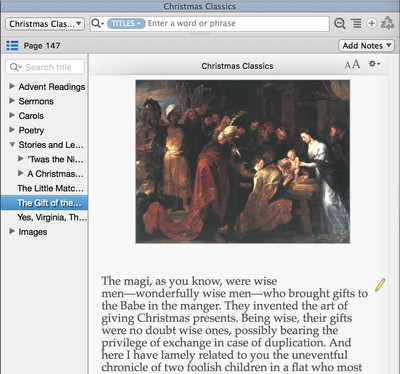For me, part of the magic of Christmas is the way the vast body of Christmas literature, music, and imagery comes together with the biblical narratives to tell a unified story of redemption and hope. For example, this past Sunday my wife and I sang “Let All Mortal Flesh Keep Silence” in church, and I was struck by its use of the imagery of light and darkness:
Rank on rank the host of heaven
Spreads its vanguard on the way,
As the Light of light descendeth
From the realms of endless day,
That the pow’rs of hell may vanish
As the darkness clears away.
 For the past several nights, I’ve been reading A Christmas Carol to my seven-year-old son, and I love passages such as this one which describe the “spirit” of the season:
For the past several nights, I’ve been reading A Christmas Carol to my seven-year-old son, and I love passages such as this one which describe the “spirit” of the season:
I am sure I have always thought of Christmas-time, when it has come round—apart from the veneration due to its sacred name and origin, if anything belonging to it can be apart from that—as a good time; a kind, forgiving, charitable, pleasant time; the only time I know of, in the long calendar of the year, when men and women seem by one consent to open their shut-up hearts freely, and to think of people below them as if they really were fellow-passengers to the grave, and not another race of creatures bound on other journeys.
A few weeks ago, I read Gift of the Magi to my English students. I love how O. Henry uses anachronism and biblical allusion to drive home the point of his story:
The magi, as you know, were wise men—wonderfully wise men—who brought gifts to the Babe in the manger. They invented the art of giving Christmas presents. Being wise, their gifts were no doubt wise ones, possibly bearing the privilege of exchange in case of duplication. And here I have lamely related to you the uneventful chronicle of two foolish children in a flat who most unwisely sacrificed for each other the greatest treasures of their house. But in a last word to the wise of these days let it be said that of all who give gifts these two were the wisest. Of all who give and receive gifts, such as they are wisest. Everywhere they are wisest. They are the magi.
“Let All Mortal Flesh” is a deeply religious hymn, while A Christmas Carol and Gift of the Magi are largely sentimental stories which make only passing mention of the birth of Jesus. Yet somehow, they all come together in a wonderful jumble of themes which manage both to delight and to inspire.
For years now, Accordance has offered a “wonderful jumble” of Bible readings, sermons, carols, poems, stories, and artwork called Christmas Classics. And for years now, I have found myself constantly turning to this delightful resource throughout the month of December. We’ve recently updated Christmas Classics so that the Advent Readings it contains now work with Accordance’s Daily Reading feature.
 |
Christmas Classics
|


